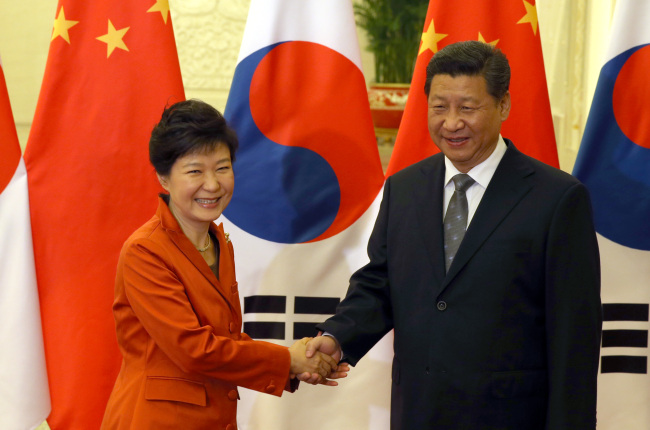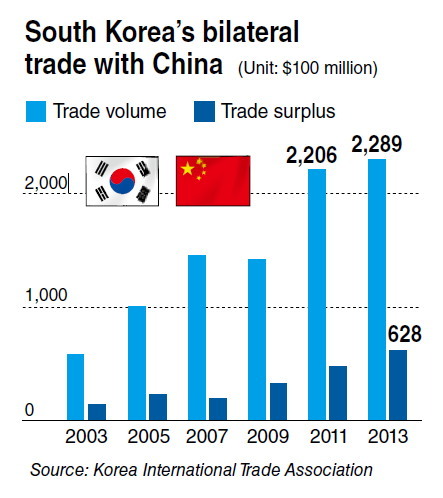Korea, China conclude FTA deal
Park, Xi agree to urge N.K. to abandon nuke
By Korea HeraldPublished : Nov. 10, 2014 - 19:56
South Korea and China wrapped up 30 months of negotiations on a free trade pact on Monday, a deal expected to open a new chapter in the economic cooperation between the two countries.
The announcement was made after South Korean President Park Geun-hye and her Chinese counterpart Xi Jinping held a talk in Beijing on the sidelines of the two-day Asia-Pacific Economic Cooperation summit.
“I am pleased to announce that South Korea and China have practically reached an agreement on the free trade pact at the summit today, after more than two years of negotiations,” Park said.
“I hope that (the two countries) can quickly work out the details and swiftly push for procedures to sign (the deal) and allow it to take effect,” she said. Xi also stressed that South Korea continues to be a good neighbor and partner of China, and urged it to strengthen efforts to further develop bilateral exchange and cooperation, officials said.
The announcement was made after South Korean President Park Geun-hye and her Chinese counterpart Xi Jinping held a talk in Beijing on the sidelines of the two-day Asia-Pacific Economic Cooperation summit.
“I am pleased to announce that South Korea and China have practically reached an agreement on the free trade pact at the summit today, after more than two years of negotiations,” Park said.
“I hope that (the two countries) can quickly work out the details and swiftly push for procedures to sign (the deal) and allow it to take effect,” she said. Xi also stressed that South Korea continues to be a good neighbor and partner of China, and urged it to strengthen efforts to further develop bilateral exchange and cooperation, officials said.

The signing of the agreed minutes on the free trade deal took place in the presence of the two leaders, said An Chong-bum, Park’s senior aide on economic affairs.
“The South Korea-China FTA is the most significant economic deal since their establishment of diplomatic ties in 1992,” An told reporters. “It will provide an occasion to drastically develop bilateral economic ties,” he added. The deal is South Korea’s 13th free trade pact. China, the world’s second-largest economy with a population of 1.3 billion, is South Korea’s largest trading partner.

The two sides will engage in technical consultation within this year, complete a draft of the agreement and hold a legal review before formally signing the agreement early next year, Cheong Wa Dae said. Both governments need to obtain parliamentary approval before it takes effect.
During the meeting, the two leaders also agreed to bolster efforts to prod North Korea to give up its nuclear program and to resume the long-stalled talks on denuclearizing Pyongyang, said Ju Chul-ki, senior presidential secretary on foreign affairs.
Xi also expressed firm opposition to North Korea’s nuclear program and reiterated that Beijing, Pyongyang’s traditional ally, fully complies with the United Nations Security Council’s resolution on the communist regime, the official said.
The leaders also agreed on the need to hold a trilateral foreign ministers’ meeting between South Korea, China and Japan within this year to seek ways to pursue peace and stability in the region.
Park arrived in Beijing on Sunday afternoon to attend the annual meeting of leaders from 21 Pacific Rim countries.
Her meeting with Xi was in the spotlight as they were widely expected to announce the conclusion of the FTA deal during the talks. She is also set to meet U.S. President Barack Obama on Tuesday.
During a previous meeting in Seoul four months ago, Park and Xi agreed to conclude FTA negotiations this year.
Trade ministers of the two countries held last-minute talks to reach a deal before the summit between the leaders. The main bone of contention was tariff cuts. South Korea had requested a wider range of cuts on industrial products, while China had made similar demands regarding agricultural and fisheries products.
Early Monday morning, the two sides agreed on a total of 22 chapters that would lift trade and investment barriers in various economic sectors ranging from services and finance to communications. Negotiators, however, agreed to exclude rice, a major agricultural product for both countries, from the deal.
Under the agreement, the two countries are obliged to lift tariffs on more than 90 percent of imported goods over the next two decades. Bilateral trade in 70 percent of farm and fisheries goods will be liberalized, officials said. South Korea, Asia’s fourth-largest economy, is expected to save annual tariffs worth $5.4 billion, according to officials at the Trade Ministry.
South Korea and China started negotiations on the FTA in May 2012 and have held 14 round of negotiations since then.
By Cho Chung-un (christory@heraldcorp.com)
-
Articles by Korea Herald







![[KH Explains] Hyundai's full hybrid edge to pay off amid slow transition to pure EVs](http://res.heraldm.com/phpwas/restmb_idxmake.php?idx=644&simg=/content/image/2024/04/18/20240418050645_0.jpg&u=20240419100350)







![[From the Scene] Monks, Buddhists hail return of remains of Buddhas](http://res.heraldm.com/phpwas/restmb_idxmake.php?idx=652&simg=/content/image/2024/04/19/20240419050617_0.jpg&u=20240419175937)

![[KH Explains] Hyundai's full hybrid edge to pay off amid slow transition to pure EVs](http://res.heraldm.com/phpwas/restmb_idxmake.php?idx=652&simg=/content/image/2024/04/18/20240418050645_0.jpg&u=20240419100350)

![[Today’s K-pop] Illit drops debut single remix](http://res.heraldm.com/phpwas/restmb_idxmake.php?idx=642&simg=/content/image/2024/04/19/20240419050612_0.jpg&u=)